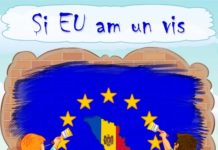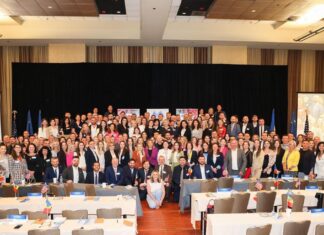In Romania, Facebook identified patterns of pages spreading divisive in order to influence public opinion. In the Romanian case, Facebook linked some of the efforts to one political entity—the PSD, which is the majority party in the leading coalition and the political party of the Prime Minister, Viorica Dăncilă.

When the news came out in Romania, it made headlines nationally but came as no surprise. In a post published on Thursday, Nathaniel Gleicher, Head of Cybersecurity Policy at Facebook wrote, “We are constantly working to detect and stop this type of activity because we don’t want our services to be used to manipulate people,” according to CNBC.
Times New Roman, a satirical news site in Romania, published a story that roughly translates as “PSD forced to handle 99,996 pages of propaganda after Facebook closes four of them.” Ana Maria Luca, a freelance reporter covering politics for Balkan Insight, said the misinformation problem is well-known in the country.
O pagină media cu 4 milioane de abonați ruși a fost blocată de Facebook
The Digital Forensic Research Lab at the Atlantic Council took a closer look at the data found by Facebook, and confirmed they were politically motivated, saying the posts, “promoted highly biased content in favor of Romania’s ruling Social Democratic Party (PSD) or denigrated politicians of the opposition.” While the Facebook post said some groups were related to individuals linked to the PSD, the Atlantic Council did not find any direct link.
In January, Facebook took down more than 300 Kremlin-linked accounts, some of them administered in Romania. Facebook told the Daily Dot in an email that the accounts deleted last week are not related to the ones taken down in January.
Radu Magdin, a political analyst who has worked in communications in Romanian politics told the Daily Dot via LinkedIn messenger, “It’s important that Facebook starts looking into the political pre-campaign environment in Eastern Europe, in a key year for Europe.”
A Facebook spokesperson told the Daily Dot via email, “We’re focused on uncovering this kind of inauthentic behavior, particularly in light of elections in many countries around the world this year.”

Like in many other European countries, according to Luca, manipulative accounts in Romania target voters in rural areas, and spread information that tends to foster nationalism and be anti-Europe and anti-establishment.
Magdin added, “European elections are an important test for how the continent manages to work with U.S. tech companies to help secure elections and clean the online environment from fake noise.”
“Russia is trying to find cracks,” Luca said. “Romania has a strong anti-Russian history, so the Kremlin is trying to find cracks to exploit group[s] of people with anti-EU, anti-NATO, anti foreign interventionist sentiments.” Because of the Soviet occupation in the 1940s and 1950s, anti-Russia sentiment is strong in Romania. “They know people in Romania will never say ‘I love Putin’ [but will] say things like ‘we hate the EU’ if they’re given some reasons to do so.”





















